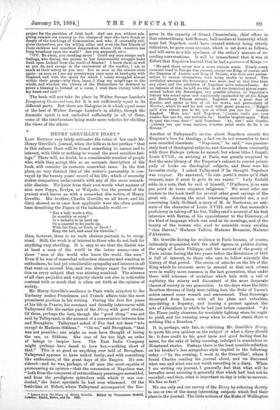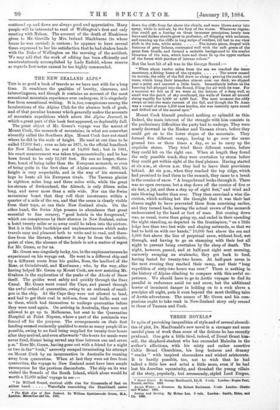HENRY GREVILLE'S DIARY.*
LADY Thump very fairly estimates the value of her uncle Mr. Henry Greville's journal, when she tells us in her preface "that in this volume there will be found something to amuse and to interest, with little or nothing to wound the most sensitive feel-
ings." There will, no doubt, be a considerable number of people who, while they accept this as an accurate description of the book, will consider its contents somewhat tame. In the first place, no very distinct idea of the writer's personality is con- veyed by the twenty years' record of his life ; which of necessity makes comparison unfavourable with any of the more remark- able diarists. We know from their own words what manner of men were Pepys, Evelyn, or Walpole; but the perusal of the present work leaves us with a somewhat dim notion of Henry Greville. His brother, Charles Greville, we all know, and his diary showed us at once how applicable were the often quoted lines describing the Figaro of the fashionable world :—
" Has a lady made a slip, In morality or scrip ?
Is a balance to be paid up, Or a quarrel to be made up, With the Czar, or Turk, or Devil ?
Ring the bell, and send for Greville."
Here, however, there is no such obvious portrait to be recog- nised. Still, the work is of interest to those who do not look for anything very startling. It is easy to see that the diarist was at least a man of the world in the better sense,—one of those "men of the world who know the world like men." Even if he was of somewhat colourless character and wanting in enthusiasm, he had yet considerable sympathy and interest in all that went on around him, and was always eager for informa- tion on every subject that was stirring mankind. The absence of all class prejudice and vulgarity stands out also in noticeable contrast with so much that is often set forth as the opinion of society.
Mr. Henry Greville's residence in Paris while attached to the
Embassy makes Frenchmen and French affairs take the most prominent position in his writing. During the first few years of his life in France, his constant and friendly intercourse with Talleyrand fills the earlier part of the Diary with good stories.
Of these, perhaps the best, though the "good thing" was not said by Talleyrand, is the account of a conversation between him and Brougham. Talleyrand asked if Fox had not been " tres occup6 de Madame Siddons." "Oh no," said Brougham, "that was not possible ; one might as soon have thought of loving the sea, as Siddons. She was of far too high an order of beings to inspire love. The East India Company might perhaps have dared to love her,—nothing short of that." This is as good as any thing ever told of Brougham. Talleyrand appears to have talked freely, and with something like enthusiasm, of the great days of the Empire. He con- sidered—and he was, perhaps, of all men the most capable of pronouncing an opinion—that the coronation of Napoleon was, "both from the concourse of extraordinary personages assembled, and from the prodigious splendour with which it was con- ducted," the finest spectacle he had ever witnessed. Of the festivities at Erfurt, where Talleyrand accompanied the Em-
• Leaves from the Diary of Henry Greville. Edited by viscountess Enfield. London: Smith, Elder, and Co. 1883. peror in the capacity of Grand Chamberlain, chief officer in that extraordinary, half-Boman, half-tnedisaval hierarchy which none but Napoleon could have created without being utterly ridiculous, he gave some account, which is set down as follows, and will serve as a fair specimen of the writer's manner of re- cording conversations. It will be remembered that it was at Erfurt that Napoleon boasted that he had a parterre of Kings :— "He said there never was a more curious scene. Nearly every crowned head in Europe was present, except our King, of course, and the Emperor of Austria and King of Prussia, who both sent ambas- sadors to excuse themselves, both being unable to attend. The cordiality amongst the Sovereigns was tnore real at that time than any other, and the adulation of Napoleon quite extraordinary. As an instance of this, he told me that in all the theatrical pieces repre- sented before the Sovereigns, any possible allusion to Napoleon's history was seized upon and rapturously applauded by all the Kings and Hereditary Princes present. Napoleon saw a great deal of Goethe, and spoke to him of all his works, and particularly of Werther, which he said he had read with great pleasure,—' Molgr6 qu'il n'en aimait pas la fin, quo ce n'itait pas one fin.' Goethe laughed. Mais non,' said Napoleon, Vaurais vonlu quo vows eussiez fait une fin, nue veritable fin.' Goethe laughed again. Main de qaoi riez-vons, dorm ? ' said Napoleon. 'Ab. sire !' said Goethe, Vaarais cm qae rola, surtout, n'auriez point voulu de fin hun Roman."
Another of Talleyrand's stories about Napoleon records the Emperor's love for theology, a fact we do not remember to have seen recorded elsewhere. "Napoleon," he said, "was passion- ately fond of theological subjects, and discussed them constantly with three Bishops (whom he named, but whose titles I forget). Louis XVIII., on arriving at Paris, was greatly surprised to find the ante-library of the Emperor's cabinet to consist princi- pally of books on theological subjects, and these were his favourite study. I asked Talleyrand if he thought Napoleon
was croyant. He answered, '.Je Buis port6a oroire kelt croyant, mais ii avait le goilt de ces sujets.' " Lady Enfield adds, in a note, that he said of himself, " D'ailleurs, je ne suis pea prive de toute croyance religiense." We must refer our readers to the book itself for several other good sayings of the great wit. Among the most interesting recorded are, a mot concerning Lady Holland, a story of M. de Narbonne, an esti- mate of the character of Louis XVIII. and of that monarch's proficiency in taking off his hat, Talleyrand's account of his first interview with Barra.% of his appointment to the Directory, of the kind of language which was used at its meetings, and of the beauty of the women who used to assemble every evening " chez Barras," Madame Tallien, Madame Recamier, Madame d'Abrautes.
Mr. Greville daring his residence in Paris became, of course, intimately acquainted with the chief figures in politics during the reign of Louis Philippe, and his account of the gossip of Paris salons during the two years before the Revolution of 1848 is full of interest, to those who care to follow minutely the history of that period. The series of attacks on the life of the King which be recounts serve to remind us that such crimes. were in reality more common in the last generation, than under those wild schemes of socialism which hide with a veil of sophistry the misery and discontent of the more desperate classes of society in our generation. In the days when the little Bourbon thrones of Italy were falling fast, the Duke of Luccal action caused some remark and amusement. That Sovereign decamped from Lucca with all his plate and valuables, appointing a Regency, and leaving a protest against the acts of Liberalism to which he had jut before consented. "As the Times justly observes, for resolutely fighting when he ought to yield, and for running away when he should stand, there is nothing like a Bourbon."
It is, perhaps, only fair, in criticising Mr. Greville's Diary, to quote his own opinion on the subject of what a diary should' be : it does credit to his good taste and good feeling that he never, for the sake of being amusing, indulged in scandalous or ill-natured stories. Perhaps there is the least possible reflection on his brother's less scrupulous style implied in the following entry :—" In the evening, I went to the Granvilles', where I found Charles reading his journal aloud, and we discussed what was and what was not worth recording in a diary. When I am writing my journal, I generally feel that what will be hereafter most amusing is generally that which bad best not be- recorded ; and then, what is important to-day is trite to-morrow. We live so fast."
We can only end our survey of the Diary by referring shortly to one or two of the many interesting subjects which find their place in the journal. The little notices of the Duke of Wellington
scattered up and down are always good and appreciative. Many people will be interested to read of Wellington's first and only meeting with Nelson. The account of the death of Huskisson given to Mr. Greville by Mrs. Ireland Bla.ckburne (to whose house he was carried) is curious ; he appears to have several times expressed to her his satisfaction that he had shaken hands with the Duke of Wellington on the morning of the accident. We may add that the work of editing has been efficiently and unostentatiously accomplished by Lady Enfield, whose reserve as regards foot-notes cannot be too highly commended.



































 Previous page
Previous page